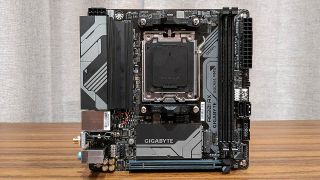Gigabyte A620I AX motherboard review

I love a good Mini-ITX motherboard. As someone who tests tech for a living, I’m fortunate to play with some seriously high end kit, but I still love it when a capable bargain board crosses my desk. Not everyone needs or wants a motherboard that costs hundreds and hundreds of dollars. Sometimes an entry level option can throw up a surprise or two.
It’s a no frills board that’s built to house a single graphics card, an SSD or two, and a mainstream memory kit
The Gigabyte A620I AX is very much an entry level Mini-ITX option. As the name suggests, it is built around AMD’s budget A620 chipset. Even an ATX A620 option won’t come with the goodies of the premium chipsets, while Mini-ITX A620 boards have to sacrifice even more. You won’t find PCIe 5.0 or CPU overclocking support, and you’ll have to give up usable PCIe lanes, SATA ports and fast USB.
As you might have guessed after reading that, the Gigabyte A620I AX isn’t what you’d call a feature rich board, but at $139 / £162 / AU$259, you wouldn’t expect it to be. A mid-range option like the MSI MPG B650I Edge WiFi I reviewed recently costs nearly twice as much, and an X670 board will set you back even more. The Gigabyte A620I is a no frills board that’s built to house a single graphics card, an SSD or two, and a mainstream memory kit with a standard set of peripherals.
The A620I AX won’t win any beauty contests. Not that looks matter much in a small form factor system when the board is often hidden. It’s a socket AM5 board that supports AMD Ryzen 7000 and 8000-series processors. The good news is, Gigabyte has already released a Zen 5 supporting BIOS, and given that AMD has stated it plans to support AM5 for some time yet, there’s every chance you’ll be able to insert a Zen 6 chip into it a couple of years from now.
Gigabyte A620I AX specs
Socket: AMD AM5
CPU compatibility: AMD Ryzen 7000 / 8000-series processors
Form factor: Mini-ITX
Memory support: DDR5-6400(OC), up to 96GB
Storage: 1x M.2, 2x SATA
USB: Up to 1x USB 10Gbps, 5x USB 5Gbps, 5x USB 2.0
Display: 1x HDMI 2.1, 1x DP 1.4
Networking: Realtek 2.5G LAN, Realtek WiFi 6E
Audio: Realtek ALC897
Price: $139 / £162 / AU$259
The board supports mainstream memory kits at up to DDR5-6200 . That’s not a lot by current standards, but that’s fine for a budget gaming PC. The VRM is very much an entry level design, too, being a 5+2+1 system. At least it’s got a reasonable heatsink. Gigabyte’s CPU support page lists support for chips including the Ryzen 9 7950X. It might be capable of handling it, but I’d suggest something a bit more upmarket in the motherboard stakes if you plan to run such a high-end chip.
The board’s real weaknesses are in its storage and connectivity capabilities. It supports just a single PCIe Gen 4 M.2 SSD and two SATA drives. That is the absolute minimum any PC gamer should put up with in these modern times of ours. The M.2 slot doesn’t include a heatsink, and the underside is actually the chipset heatsink, which will only add heat to an SSD. I’d certainly recommend buying an SSD with an integrated heatsink.
The rear I/O isn’t filled with ports, either, and it lacks an integrated shield, which is a rare thing these days. There are six USB ports, made up of a single 10 Gbps port, two 5 Gbps ports—one of which is Type-C—plus three USB 2.0 ports. There’s a BIOS flashback button, DP 1.4 and HDMI 2.1 ports, which are essential for using integrated graphics and especially 8000G-series chips. Incidentally, if used with the latter, you’d have yourself an appealing and affordable little gaming system.
The networking capabilities are as good as you can hope for in this price range. Realtek 2.5G LAN and WiFi 6E are all you’d reasonably expect on boards costing twice the price. It’s Realtek all-round as the audio codec is ALC897. Again, not unexpected in this price range.
System Performance
Gaming Performance
Test rig
CPU: AMD Ryzen 7 7700X
Graphics: Nvidia GeForce RTX 4090 Founders Edition
RAM: 2x 16GB G.Skill Trident Z5 DDR5-6000 C36
Storage: 2TB Kingston KC3000
Cooling: Cooler Master PL360 Flux 360mm AIO
PSU: Corsair HX1000i
For testing, I used a Ryzen 7 7700X rather than the 7950X I would normally use for AM5 testing. It just makes more sense to use such a chip with an entry level board, and even the 7700X has a 105W TDP, and can use up to 142W at default. A 65W option makes more sense with an A620 board like the A620I AX. The VRM heatsink proved to be adequate and didn’t get hot to the touch.
When compared to a couple of B650 motherboards including the ASRock B650E PG-ITX WiFi, the little Gigabyte did what was expected of it. In fact, in the CPU limited gaming tests, the Gigabyte squeaked out a consistent lead, which bodes well if you plan to build a gaming rig with the A620I AX.
Buy if…
✅Your budget won’t stretch to include a discrete graphics card: Pair it with a Ryzen 8000-series APU and you’ll have the most affordable path to 1080p gaming you can get right now.
✅ You’re on a super-tight budget: There are cheaper non-ITX boards, but this is about the cheapest option there is if you want to build a new and powerful Mini-ITX system.
Don’t buy if…
❌ You have lots of peripherals or storage: You can’t expect too much of a $139 ITX board. It’s not one for the file hoarders or users with lots of USB devices.
❌ You have a powerful CPU: The boards’ VRM is quite basic. If you have a 105W or higher CPU, you’re better off with something upmarket.
Whether you should consider buying the Gigabyte A620I AX will essentially come down to how large or small your budget is. If you’ve got a 105W CPU, then I’d recommend looking upmarket. But if you’re on a tight budget, then there are some key characteristics that make it an interesting option.
I believe it will be a solid choice if you plan to build a small form factor system with a Ryzen 8000-series APU. You’ll be able to game at 1080p, and the savings you make from not having to buy a GPU could be significant.
It’s also the kind of board that only really makes sense for a fairly basic system, even if you use a high-end graphics card. Add an M.2 SSD for your OS, a SATA drive for a game library, and 32GB or 64GB of memory and you’ve got the core of a capable SFF system.
There’s not much competition in this price range. The ASRock A620I Lightning WiFi is an option. It can house a second M.2 SSD, but it lacks a rear DP port, which I’d consider essential for gaming with integrated graphics. The choice in the end would be yours.
The Gigabyte A620I AX is a no frills board that does the realistic minimum. It’s a solid but unspectacular option, though its important to keep expectations in check at this price point. It’ll happily sit at the heart of a budget gaming system, and with its ability to house upcoming Zen 5 CPUs, it’ll also have a good life ahead of it.





